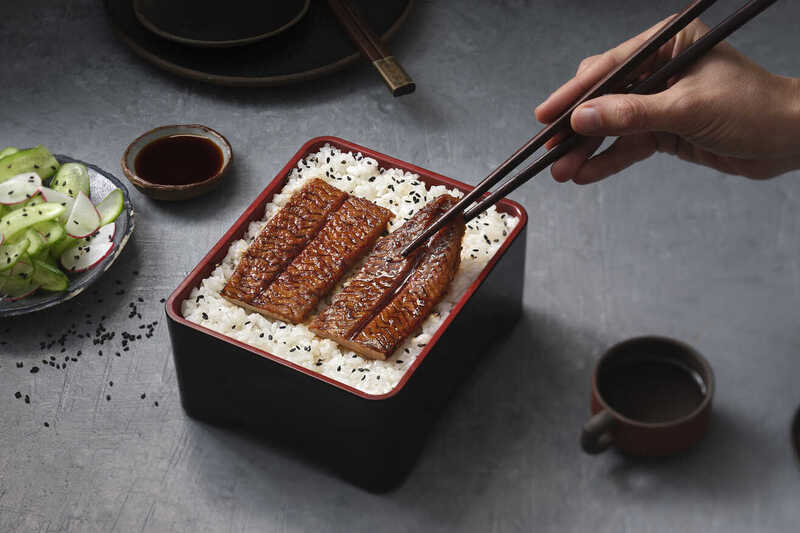Forsea breaks new ground by introducing the world’s first cultured eel

Cell-cultured seafood start-up Forsea Foods has successfully replicated the traditional Japanese unagi eel (Anguilla japonica) featuring the same tender, succulent texture and rich savoury flavour as real eel.
The visionary start-up has been working together with the celebrated executive chef Katsumi Kusumoto to create two popular traditional Japanese dishes – unagi kabayaki (marinated grilled eel over rice) and unagi nigiri. Kusumoto runs the vegan restaurant Saido in Tokyo, which was voted the world’s best vegan restaurant in 2019 by the online vegan and vegetarian restaurant guide Happy Cow.
The company has achieved a working proof-of-concept that embodies the sensory attributes of real eel meat and is now prepped for scale-up. In the collaboration, Forsea contributes its novel technology for cell-cultivating eel cuts, while Kusumoto contributes his culinary mastery to refine the product to perfection in texture and flavour. Forsea was the winner of the Startup Pitch Hour Prize at the Asia-Pacific Agri-Food Innovation Summit last October in Singapore.
“Unagi is an enduring favourite in Japan,” informs Kusumoto. “Its timeless appeal, however, is impacted by a growing awareness among the Japanese population of the need to take a more sustainable approach. It’s been a thrilling journey to join forces with emerging innovators, and working together to deliver the traditional unagi indulgence with a clear eco-conscience.”
Forsea was founded in 2021 with a mission to turn the tide on the downward spiral of the ocean’s seafood populations by developing a cell-cultivated alternatives. Overfishing of eels has turned this aquatic delicacy into an endangered species. The immense popularity of eel meat in Asia, Europe, and the US likewise poses significant challenges for suppliers who struggle to keep up with the surging demand. This leads to supply bottlenecks, illegal trade, and high prices.
“This milestone marks a major leap in our journey to deliver delicious cultured seafood products,” claims Roee Nir, CEO and co-founder of Forsea. “Forsea is pioneering the fusion of traditional, high-quality Asian cuisine with ground-breaking technology to create the world’s first cultured unagi—one that will provide the consumer with a genuine seafood experience without putting further strain on aquatic life.”
Beyond its contribution to ocean conservation, Forsea’s cell-cultivated eel offers a nutritious alternative that is free from any antibiotics, hormones or ocean pollutants.
Forsea is readying itself to scale-up production and fulfil the vision of an abundant eel supply through a proprietary method for culturing seafood. Organoid technology allows for the crafting of 3D microtissues composed of fat and muscle. These spontaneously differentiate into edible cells, mimicking the natural process of cell formation. The cell lines self-organise into tissue structures without the need for scaffold support, simplifying the production process, and enhancing scalability.
This approach should effectively overcome major industry challenges and will ease some of the supply bottlenecks for eel meat. The proprietary practice also allows for the efficient and cost-effective production of cultivated meat by significantly decreasing reliance on costly growth factors.
Forsea projects that its inaugural product will be ready for commercial launch in 2025 as it seeks strategic partners in Japan (the largest consumer of freshwater eel) and across Asia. EU and the US also are also on its radar as rapidly developing markets.
To accelerate progress, Forsea has expanded its team, forming new engineering and food applications departments. Nir has appointed Mayu Sugisaki as business development manager in Japan in order to cement its presence in the Asian food market.
Related content
Source: foodanddrinktechnology.com

